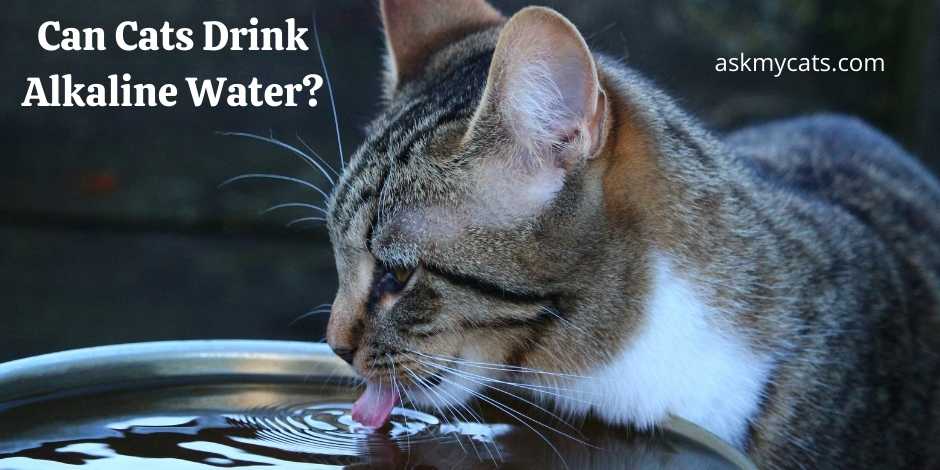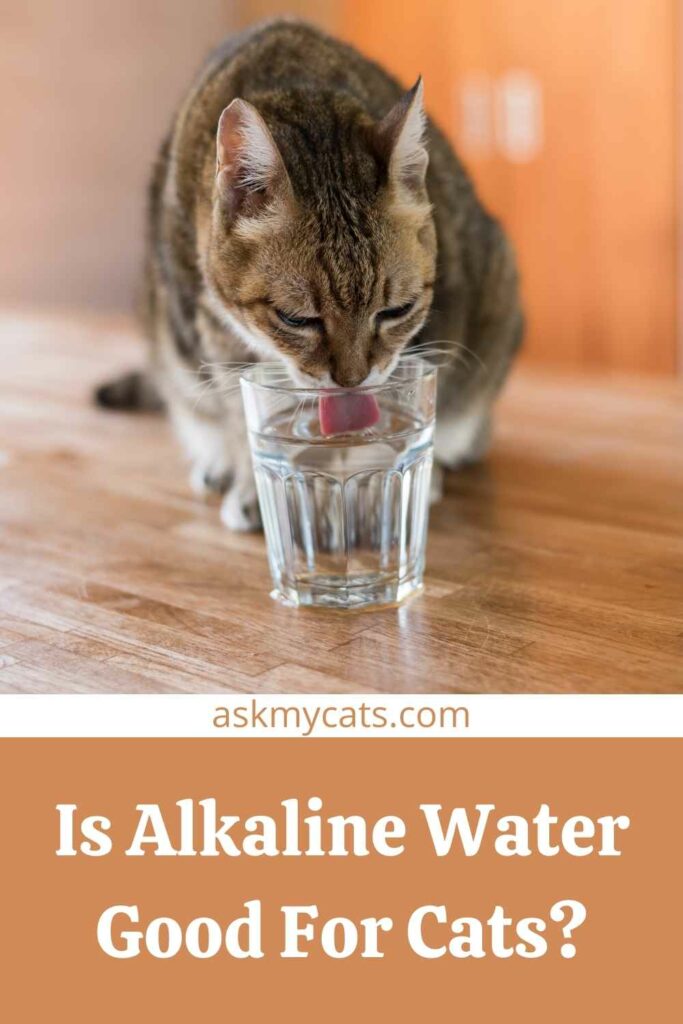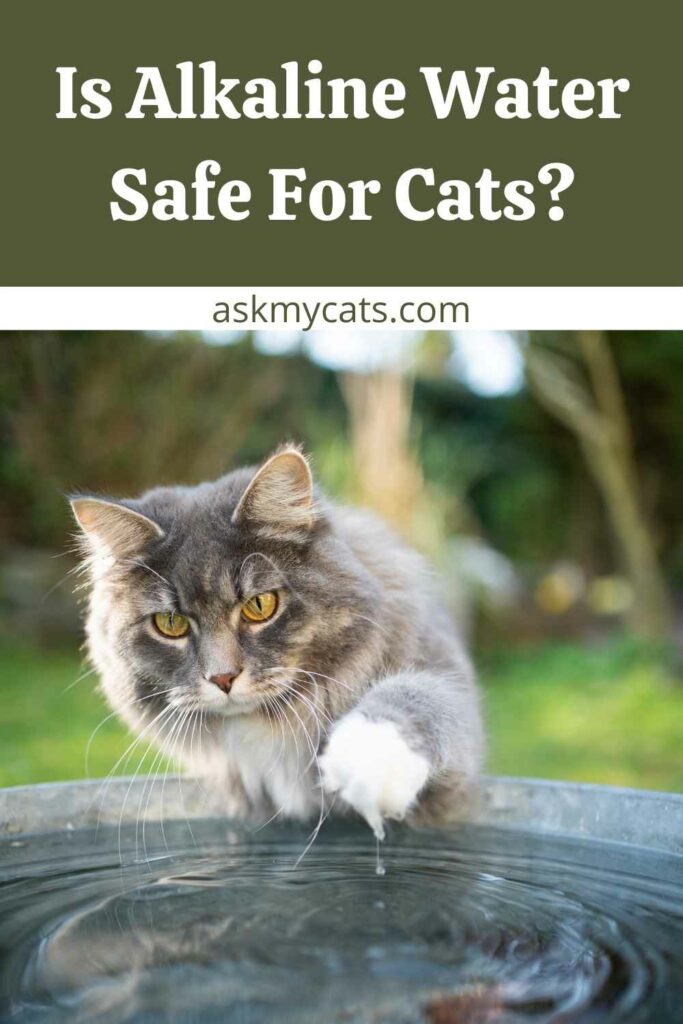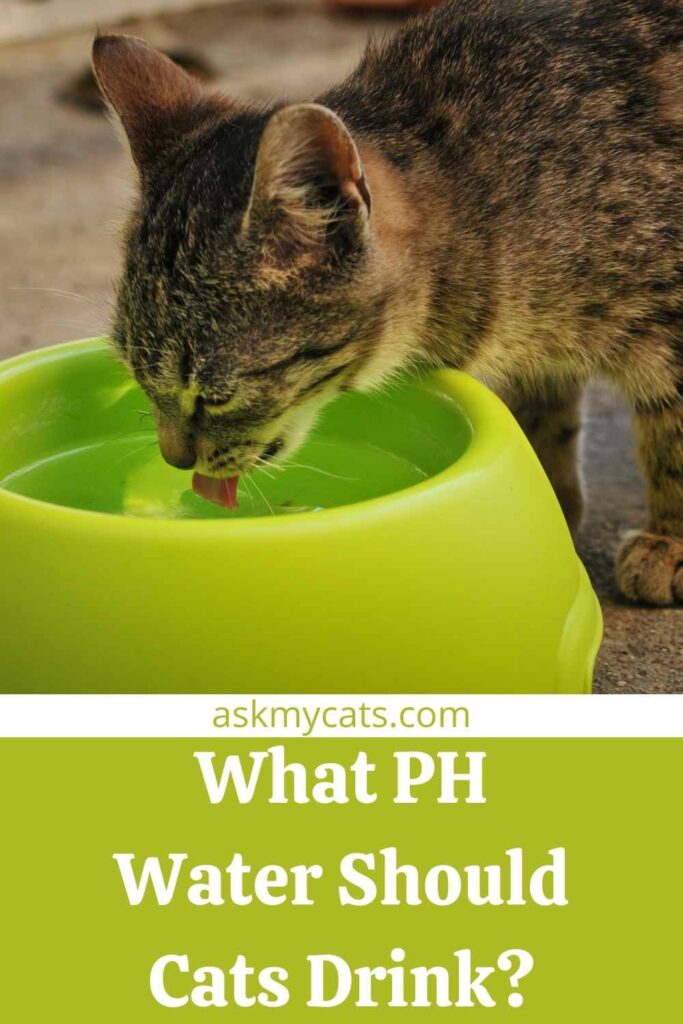Water is an often-overlooked component of a cat’s diet. It’s a necessary part of life for a cat to survive, and it must be available. This is why it’s critical to pay attention to the sort of water your cat consumes on a daily basis and whether or not it’s safe.
Cats should not drink alkaline water, particularly after feeding. The alkaline water will have a detrimental effect on the cat’s natural digestive acids, making food digestion harder.
The basic idea is to give the cat the same amount of water that you will be consuming. Water that is free of pollutants and/or extra chemicals should be used.
Continue reading to learn more about these circumstances and the finest kind of water to use in them.


Give Your Cat the Perfect Day
Get the Free Ebook!
Is Alkaline Water Good For Cats?
Alkaline water is only good for cats when given in small amounts.

Water with a pH of 8 to 9 is considered alkaline. The pH of a material indicates how acidic or alkaline it is. It’s rated from 0 to 14 on a scale of 1 to 14. Any material with a pH less than 7 is acidic, whereas those with a pH of more than 7 are alkaline or basic.
However, pH isn’t the only criterion for determining if your water is acidic or alkaline. Minerals (calcium, magnesium, bicarbonate, potassium, and so on) with a negative oxidation-reduction potential ORP make alkaline water alkaline (which measures how oxidising or reducing a substance is).
The ORP of alkaline water is negative. This implies that in the case of a chemical reaction, it can swiftly give up its electrons to any other material. These electrons are taken by the body when we (or our cats) drink alkaline water, and they then eliminate free radicals.
Alkaline water is okay for cats as long as you don’t give it to them when they’re taking medicine, eating, or nursing.
Increasing your cat’s water consumption might sometimes assist with urinary issues, according to veterinarians. This can happen as a result of the water draining toxins out of your cat’s bladder, kidneys, and the rest of his urinary tract.
Cats with renal illness can’t manage their pee, which is a well-known truth. This implies they urinate more frequently than they wish, dehydrating themselves. Alkaline water, which is better absorbed by the human tissues, can help to alleviate this problem.
When they digest food, this permits their stomach to generate acidic waste, which can cause acid reflux in their chest. Because of its alkaline pH, alkaline water can help prevent acid reflux.
Most of us are aware that, like humans, cats and dogs acquire aching joints as they age. However, what we don’t realise is that alkaline water can be a solution to this problem. Alkaline water can help your cat stay flexible by preserving the health of cartilage, the tissue that keeps joints pain-free.
Calcium is one of four key minerals found in alkaline water and is essential for your cat’s bone health, as well as neuron, muscle, and heart function. Calcium is also important for your cat’s healthy teeth, and a lack of it might make him weak, restless, irritable, and hypersensitive.
Is Alkaline Water Safe For Cats?
Alkaline water is safe for cats for small amounts only.

The fundamental problem is that alkaline water’s pH levels are too high.
This isn’t good news for a cat’s digestive system’s normal pH levels. When the two interact, it might cause major health risks for the cat.
Food digestion will be tough for the cat, and it will get progressively difficult after a meal. This is why providing alkaline water to a cat after a meal is a bad idea.
This will cause a great deal of injury to the cat, as well as serious stomach troubles.
Take a look at what the cat is drinking and seek a consistent supply of water. These are water sources whose pH levels have not been altered or influenced.
Your cat will have a healthy life if you provide it with the proper sort of water, and its digestive system will continue to function normally.
When it comes to feeding water to a cat, many cat owners will go through the motions. This includes just thinking that all water sources are safe for cats.
To keep a cat healthy, it’s crucial to avoid providing it with alkaline water. This can be done before or after a meal. If you do this, your digestive system will get agitated, and you will experience a variety of symptoms.
Because the alkaline water affects the digestive health of cats, they may get sick and/or vomiting. It is because of this that it is harmful and unsafe for cats.
Sticking to other water sources is in your cat’s best interest.
Throughout the cat’s body, alkaline water will cause more harm than benefit. This applies to the digestive system as well as other elements of the cat’s health.
When you provide alkaline water to a pet cat, the entire body needs to metabolise water, which isn’t easy. What will happen is that the cat will become lethargic and unwilling to move.
This might involve the cat refusing to eat because it believes the food is not being digested correctly.
A cat’s body will struggle to cope with a high volume of alkaline water, which can cause stomach problems and weariness.
As you can expect, this might result in a distressing scenario in which the cat is ill and refuses to eat.
Because the cat needs water, it will drink the alkaline water until it becomes unwell.
Advantages Of Alkaline Water For Cats
- It provides the correct (acidic) pH for skin and hair.
- It acts as an astringent, which tones and conditions skin.
- Alkaline ionised water helps flush out the acidic waste accumulated in your pet’s system.
- The higher pH level in the water will neutralize the stomach acids required for food digestion.
- It can neutralize the other acids in your cat’s body.
Disadvantages Of Alkaline Water For Cats
- The high pH could make your skin dry and itchy or cause an upset stomach, but that’s about all.
- Nausea
- Vomiting
- Tremors
- Muscle twitching
- Tingling in the extremities or face
- Confusion
What PH Water Should Cats Drink?

It is advised that cats drink water with a pH of 6.2 to 6.4.
This is beneficial to a cat’s digestive tract and surrounding organs, ensuring that foods are easily digested. Any deviation from this range will result in symptoms such as tiredness, nausea, and/or constipation.
Spring or tap water is the finest water for cats to drink. These are the cleanest water sources, with the ideal pH for a cat’s digestive tract.
Your cat’s metabolism will be boosted by alkaline water, allowing the drug to be digested more quickly. You don’t want that to happen since it’s critical that the drug is delivered into the body at the medically advised rate. Otherwise, it may not provide the desired outcomes.
During breastfeeding animals take more calcium from alkaline water than is expected. Hypercalciuria, a disorder that can affect the cat’s kidneys, neurological system, and cardiovascular system, may result as a result of this.
Is High PH Water OK For Cats?
No, high Ph water is not ok for cats.
Because it is created with a pH that is properly balanced between 6.2 and 6.4, it supports an appropriate urine pH for cats. It also helps to reduce the presence of minerals that cause crystals and stones in the bladder since it contains no minerals.
An alkaline food, when combined with alkaline water, can provide your pet with bioavailable minerals. Although there is no evidence that an alkaline diet may modify your pet’s internal pH, consuming alkaline foods assures that your furry pals are getting nutritious, mineral-rich meals.
Is Alkaline Water Good For Cats With Kidney Disease?
Alkaline water can be beneficial to cats suffering from renal illness and kidney diseases.
When a cat’s kidney stops working, the body begins to accumulate too much acid, which is known as metabolic acidosis. Alkaline water may assist with renal illness by neutralising the acids.
Frequently Asked Questions
What water should cats drink?
Is it safe for cats to drink distilled water?
We recommend filtered tap water or spring water for drinking. In general, if the water is safe for you to drink, it is safe for your pet to drink as well. Use distilled water instead of tap water since distilled water is acidic and can drop your cat’s urine pH below 6, which can lead to stones or crystals.
What can cats drink besides water?
If your cat refuses to drink fresh water, try boiling some simple chicken breast or white fish and feeding the cooking liquid to them to persuade them. There should be no salt or oil in this. You might also inquire with your veterinarian about whether or not oral rehydration fluids are appropriate.
Final Words
Alkaline water should not be consumed by cats. It is preferable to provide a cat with tap or spring water at home. This will benefit their long-term health and eliminate the need for them to struggle with unpleasant symptoms.
If you have any questions, ask us in the comments section below.
